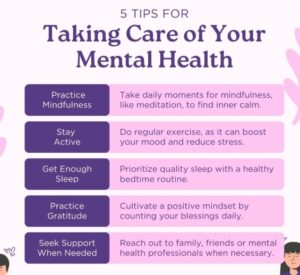10 Ways to Improve Your Mental Health Naturally: A Joyful Guide to Wellness
Mental health isn’t just about avoiding stress—it’s about embracing habits that spark joy, resilience, and balance. Whether you’re battling daily pressures or seeking a brighter outlook, these natural strategies can help you thrive without relying on medication. Let’s explore science-backed methods to lift your mood and calm your mind.

1. Reconnect with Nature and Movement
Walk in the woods (or your local park)
Spending time outdoors reduces cortisol (the stress hormone) and boosts serotonin. Even a 20-minute stroll among trees can reset your mental state. If you can’t get outside, open your windows to let sunlight in or decorate your space with plants.
Dance like nobody’s watching
Exercise releases endorphins, your brain’s natural mood elevators. You don’t need a gym—blast your favorite playlist and move freely. Studies show dancing improves self-esteem and reduces anxiety more effectively than repetitive workouts.
Try “green therapy” gardening
Planting herbs or tending to houseplants fosters mindfulness. The act of nurturing growth—even a small succulent—creates a sense of purpose and accomplishment.

2. Nourish Your Brain and Body
Eat the rainbow (and some salmon)
Foods rich in omega-3s (like salmon, walnuts, and flaxseeds) support brain function and fight inflammation linked to depression. Colorful fruits and veggies provide antioxidants that protect neural pathways. Swap sugary snacks for dark chocolate—it’s packed with mood-boosting magnesium.
Hydrate your happiness
Dehydration worsens fatigue and brain fog. Start your day with a glass of water and add lemon or mint for flavor. Herbal teas like chamomile or green tea can calm nerves without caffeine crashes.
Master the art of mindful eating
Slow down during meals. Savor each bite, notice textures, and appreciate how food fuels your body. This practice reduces overeating and strengthens your connection to nourishment.
3. Cultivate Joyful Habits
Start a “gratitude jar”
Write one thing you’re thankful for daily on a slip of paper—a sunny day, a friend’s laugh, or your cozy socks. Empty the jar weekly to remind yourself of life’s small joys. Research shows gratitude practices rewire the brain to focus on positivity.
Host a “digital detox” hour
Unplug from screens 60 minutes before bed. Replace scrolling with reading, puzzles, or chatting with loved ones. Reducing blue light exposure improves sleep quality, which is vital for mental clarity.
Adopt a pet (or borrow one)
Interacting with animals lowers stress hormones and increases oxytocin. No furry friend? Volunteer at a shelter or watch bird feeders from your window.
Laugh intentionally
Watch a comedy, share memes with friends, or reminisce about funny memories. Laughter triggers dopamine release and relaxes muscles—think of it as a free yoga session for your soul.
Create a “mindfulness corner”
Designate a cozy nook with cushions, soft lighting, and calming scents (lavender or eucalyptus). Spend 5–10 minutes here daily to breathe deeply, meditate, or journal.
Bonus: Small Shifts, Big Impact
Sleep cooler: Keep your bedroom between 60–67°F (15–19°C) for deeper rest.
Swap coffee for matcha: It provides steady energy without jitters.
Hug someone (or yourself): Physical touch releases oxytocin, easing anxiety.